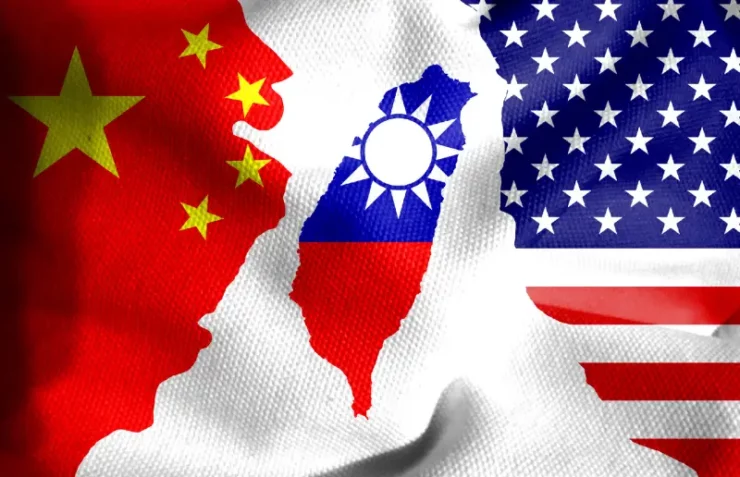
The newly elected Taiwan president recently met lawmakers visiting from the US. Their job was to solidify the US-Taiwan alliance. In this meeting, Lai Ching-te urged US politicians to push for legislation that would allow Washington to send – and sell – more and more weapons to Taiwan to counter China.
The delegation of six House members, led by Michael McCaul, chairman of the House Foreign Affairs Committee, is the first group of US officials to visit Taiwan after the island’s President Lai Ching-te took office on May 20. “We are moving forward on those weapons systems,” said McCaul at a news conference in Taipei after his meeting with Lai. “I’d like to see them faster, but they are forthcoming”, he added. Taiwan’s ‘request’ and the US lawmakers’ display of urgency come against the backdrop of recent Chinese military drills, also known as “punishment drills”, that were ostensibly designed, according to the US media’s interpretations of these drills, to “seize power” on the island. These drills, in turn, come against the backdrop of anti-China politicians winning elections and adopting a more provocative stance towards China – a stance that surely has Washington’s support.
Historical Context of US Arms Sales to Taiwan
Lai’s new request notwithstanding, Washington has been arming Taiwan for many decades now. The Trump administration, for instance, sold weapons worth US$18.27 billion to Taiwan between 2017 and 2020. Since August 2021, according to one estimate, the Biden administration has sold weapons worth almost US$5 billion. This is apart from the grants the US gives. Last year, for instance, the Biden administration gave a US$80 million grant to help Taiwan buy military equipment from the US, and this figure doesn’t include weapons that the US intends to sell in the near future.
Obviously, this grant will feed the entire money back into the US, since the equipment will be bought from the US. Similarly, all weapon sales approved by various administrations also bring back the Taiwanese money into the US exchequer. To that extent, weapon sales to Taiwan directly benefit the US military-industrial complex. But, as far as the US grand strategy is concerned, realpolitik also has its influence on the way things are unfolding.
For sure, the US does not want China to territorially claim Taiwan and establish its sovereign control. Were that to happen, for instance, this would be a major strategic defeat of the decades-old US position. This defeat will have at least two major consequences. First, it will elevate China’s status in the region vis-à-vis states it has territorial conflicts within the East and South China Seas. It will also impact China’s ties with other states in the wider Southeast Asia and the Pacific Ocean. Secondly, a US strategic defeat in this region will have global repercussions, since it would significantly impact the US claim to be the sole superpower. Therefore, ensuring that Taiwan has a pro-US political leadership and filling the country with made-in-US weapons makes a lot of strategic sense to the policymakers in Washington, insofar as it is inevitably tied to the future of the US position in the global system.
US Military Strategy in Taiwan
In fact, the policy of saturating Taiwan with weapons is a fact now well-known even in the West. There are at least two different calculations informing this policy. In 2022, US strategists, after closely observing Chinese military and naval drills and unearthing Beijing’s actual military strategy behind them, ‘discovered’ that China, in the event of a conflict, will impose a naval blockade on Taiwan to prevent any further US military supplies from reaching the Island. This will, in Chinese calculations, ensure Taiwan’s surrender.
Therefore, the US aims to saturate Taiwan with enough weapons to enable it to fight for long enough. If Taiwan were not an island, China would not have developed a blockade strategy, and US strategists might have adopted a different military strategy and foreign policy. However, Taiwan’s territorial properties appear to be directly conditioning the US policymakers’ policy preferences. If Taiwan had a large enough stockpile, this could, in the US calculations, allow the US to mobilize enough international political opinion and/or put diplomatic pressure to prevent an ultimate Chinese takeover.
A second factor pushing the US, since at least 2022, to send – and sell – more and more arms to Taiwan is the ongoing conflict in Ukraine. Since early 2022, the US and NATO have sent weapons worth billions of dollars to Ukraine to fight the Russians. But, in the past two years, the US has also faced a lot of difficulty in sending weapons efficiently – and in sufficient quantity – to Ukraine to ensure the latter’s victory. This, according to the US and even Ukrainian officials, has negatively impacted the Ukrainian forces’ ability to push back the Russian military forces from their own territory. Therefore, in order to avoid a repeat of the Ukraine debacle, the US is pushing for sufficient weapon supplies as soon as possible.
But, as it stands, all of this shows an anticipation in the US about an eventual Chinese invasion of Taiwan. The real question, therefore, is: will China invade? Whether or not China will do this is a moot question, but the US strategy of arming Taiwan to the teeth is surely driving China into adopting a policy that does not rule out military conflict. For the US, China’s resort to military force against Taiwan will still help the US. Just as the US has been able to force Europe to boycott oil and gas purchases from Russia, Washington intends to use the scenario of the China-Taiwan conflict to mobilize the EU against China and accomplish the so-called “de-coupling”.
Salman Rafi Sheikh, research analyst of International Relations and Pakistan’s foreign and domestic affairs, exclusively for the online magazine “New Eastern Outlook”.
